

To Be. Have Got. GRAMATICAL ORDER. Present Simple Use. Okay, now you know how to make the present simple.
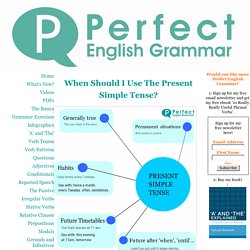
But how do we use it? In fact, we use this tense in several different situations: (More about the difference between the present simple and the present continuous here.) My Present Simple Video 1: First, we use the Present Simple when something is generally true: The sun rises in the east.People need food.It snows in winter.The sky isn't green.Plants die without water.Two and two make four. 2: We also need to use this tense for a situation that we think is more or less permanent (see the present continuous for a temporary situation - one which we think won't last long): Where do you live? 3: The next use is for habits or things that we do regularly. Do you smoke? 4: Four, we use the simple present to talk about what happens in books, plays, or films: 5: We use it in the first and the zero conditionals: If it rains, I won't come.If you heat water to 100 degrees, it boils. 6: Strangely, we can use this tense to talk about the future.
Form. (Download this explanation in PDF) We need to use the Present Simple a lot in English, so it's really important to understand it well.
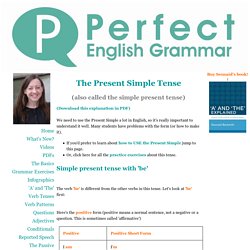
Many students have problems with the form (or how to make it). If you'd prefer to learn about how to USE the Present Simple jump to this page.Or, click here for all the practice exercises about this tense. Simple present tense with 'be' The verb 'be' is different from the other verbs in this tense. Here's the positive form (positive means a normal sentence, not a negative or a question. Click here to practise making the positive with 'be'. Next, here's the negative. Click here to practise making the negative with 'be'. Present Simple Exercise 1. Here's an exercise where you need to make the present simple positive.
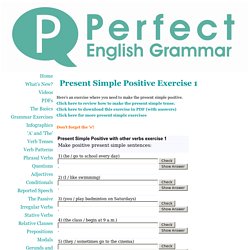
Click here to review how to make the present simple tense.Click here to download this exercise in PDF (with answers)Click here for more present simple exercises Don't forget the 's'! Learning English as a foreign language: Tip #1 Read often in English. It's not important if you are a beginner or not - reading will really help you to improve your English grammar, vocabulary and writing. Present Simple Exercise 2. Here's another exercise where you need to make the present simple positive.
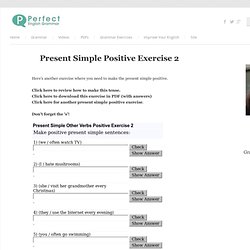
Click here to review how to make this tense.Click here to download this exercise in PDF (with answers)Click here for another present simple positive exercise. Don't forget the 's'! Learning English as a foreign language: Tip #2 Watch films and TV in English. It's great if you can find a series you enjoy. Present Simple Exercise 3. Here's an exercise where you need to make the present simple negative.
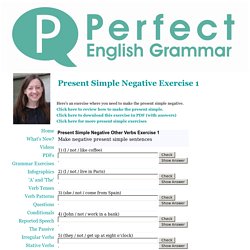
Click here to review how to make the present simple. Click here to download this exercise in PDF (with answers)Click here for more present simple exercises Learning English as a foreign language: Tip #3 Try reading a newspaper in English - there will be a lot of difficult words, it's true, but don't try to read the whole thing at once.
Choose one article about a subject you're interested in, and read it slowly with your English dictionary - just try to understand the main idea. Present Simple Exercise 4. Here's another negative present simple exercise - type the whole sentence into the box and click 'check'.
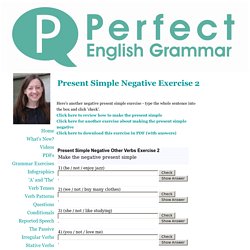
Click here to review how to make the present simpleClick here for another exercise about making the present simple negativeClick here to download this exercise in PDF (with answers) Learning English as a foreign language: Tip #4 Do grammar exercises about the English verb tenses until you feel really confident about how to make the tense. Many students say 'the past simple - that's easy', but then they still say 'Did you went', which is not correct of course. Or they forget the 's' in the 3rd person singular present simple. Click here for more present simple exercises. Present Simple Exercise 5. Present Simple Exercise 6. Present Simple Exercise 7. Adverbs of Frequency. PRESENT SIMPLE.
Index. British Council.